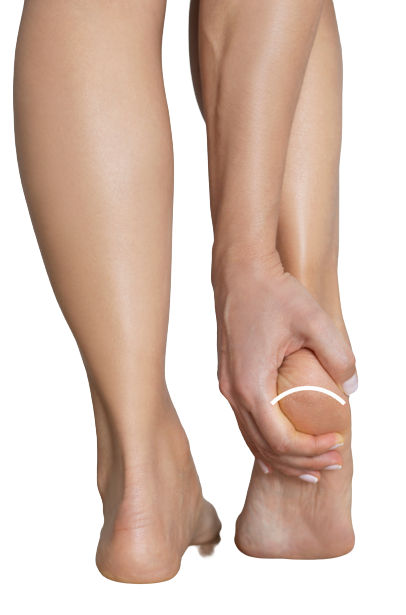Plantar Fasciitis
About Plantar Fasciitis
Plantar Fasciitis is the inflammation of the plantar fascia – the rubber band-like ligament that stretches from your heel to your toes. It is attached to the metatarsal bones of the five toes in the front and is fan-shaped on the inside of the heel. It supports the arch of your foot and bears the weight of your body.
What Causes Plantar Fasciitis?
Inflammation and tearing of the plantar fascia can result from too much pressure and stretching.
Those at greater risk of plantar fasciitis include:
- Athletes
- People with a high arch or flat feet
- People who are overweight
- People who stand for prolonged periods

What Causes Plantar Fasciitis?
Inflammation and tearing of the plantar fascia can result from too much pressure and stretching.
Those at greater risk of plantar fasciitis include:
- Athletes
- People with a high arch or flat feet
- People who are overweight
- People who stand for prolonged periods
Symptoms Of Plantar Fasciitis
Heel pain
Tenderness
Prolonged pain
Pain in the arch of the foot
When Should I Seek Medical Help?
You should seek medical help when:
- Sharp pain when stepping out of bed in the morning
- Pain from any movement of the foot
- Long period of standing aggravates the pain
- Pain is dull at the beginning of activities but worsens through the day
A Message About Plantar fasciitis
Plantar fasciitis pain can range from mild to severe and debilitating. It may cause limping or inability to walk. While generally, it is unilaterally one-sided, it may inflict both feet concurrently. The severity of pain does not correspond to the severity of the condition. It may start as inflammation of the plantar fascia tendon or it may be a severe injury involving tears of the cords of the tendon.
While initial self-remedy such as using a tennis or golf ball to roll the injured sole may be helpful, prolong persisted application of this will result in worsening of the condition. Similarly walking barefooted on stones/pebbles or using a stick to prod at the tender area may give temporary relief, but long-term use will result in aggravation of the condition.
About 30% of patients will fail physiotherapy and orthosis support. These patients will benefit from Myospan PRP treatment. Our proprietary Coreflex injection will target the injured plantar fascia by injecting platelet-rich plasma into the inflamed area it stops the swelling and improves scarring and healing. There is no downtime. Post-procedure, active rehabilitation encourages the healing of the plantar fascia, resulting in full resolution of the condition.
Diagnosing Plantar Fasciitis
Although many people have heel spurs, it is important to note that heel spurs are not the cause of Plantar Fasciitis pain. There is no need to remove or excise the “bone spur”. Here at Singapore Paincare, our team of experienced primary care and specialist pain care doctors will conduct a thorough diagnosis. This includes a physical exam, questions about your symptoms and an evaluation of your medical history. An X-ray or MRI scan may be needed to evaluate the condition.
What Treatments Are Available for Plantar Fasciitis?
In many instances, non-surgical treatment methods can provide excellent outcomes. At Singapore Paincare, we strive to treat your pain with the least invasive option possible after accurately identifying the cause. Our approach to pain resolution focuses on the removal of pain generators via specialised injection and minimally invasive procedures. Combined with pharmacological treatments and cognitive and physical rehabilitative therapies, we help patients improve functions and prevent pain from recurring.
Non-Surgical Treatments for Plantar Fasciitis
Orthotics
Physiotherapy
Non-steroidal anti-inflammatory drugs (NSAIDs)
Specialised Injections – Myospan injections
If cortisone injections are inadequate, Myospan PRP (Platelet Rich Plasma) injections are also utilised by our doctors to have more directed healing of the injured tendon.
Extracorporeal shock wave therapy
Surgical Treatments for Plantar Fasciitis
Surgical options for Plantar Fasciitis will only be considered after non-surgical treatments have been attempted for at least 6 months. As surgery always comes with associated risks, complications and downtime – it may not be suitable for everyone.
Endoscopic plantar Fasciotomy (EPF)
How Can I Prevent Plantar Fasciitis?
You can lessen the risk of having Plantar Fasciitis by:
- Doing regular stretches involving your feet, calves and Achilles tendon
- Taping your arches
- Getting plenty of rest
- Doing low-impact exercises like swimming
- Wearing proper footwear when exercising and doing sports
Get Your Pain Resolved
Send your enquiries or consult our pain experts today.


